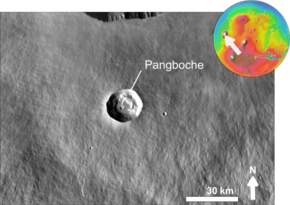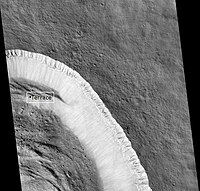 Pangboche Crater based on THEMIS daytime image | |
| Planet | Mars |
|---|---|
| Coordinates | 17°13′N 133°37′W / 17.22°N 133.62°W |
| Quadrangle | Tharsis |
| Diameter | 10 km |
| Eponym | a village in Nepal |
Pangboche is a young impact crater on Mars, in the Tharsis quadrangle near the summit of Olympus Mons.[1] It was named after a village in Nepal.[2] It measures 10 kilometer in diameter, and is at 17.47° N and 133.4° W.[2]
The average depth of the crater is 954 m, and the height of the crater rim varies between 80 and 240 meters.[1] Pangboche formed in young lava flows on the flank of Olympus Mons.[1] The morphology of Pangboche is very similar to that of lunar craters, likely due to the lack of volatiles in both the atmosphere and the target.[3] It lacks several features often attributed to the presence of volatiles in the target rocks, including layered ejecta and lobate flows. It is a complex crater featuring a flat floor and several terraces.[1] Pangboche is estimated to be less than 240 million years old.[1][4]

- ^ a b c d e Mouginis-Mark, Peter J. (1 January 2015). "Cratering on Mars with almost no atmosphere or volatiles: Pangboche crater". Meteoritics & Planetary Science. 50 (1): 51–62. Bibcode:2015M&PS...50...51M. doi:10.1111/maps.12400. ISSN 1945-5100.
- ^ a b "Pangboche (crater)". Gazetteer of Planetary Nomenclature. USGS Astrogeology Research Program.http://planetarynames.wr.usgs.gov
- ^ Osinski, Gordon R.; Tornabene, Livio L.; Grieve, Richard A. F. (1 October 2011). "Impact ejecta emplacement on terrestrial planets". Earth and Planetary Science Letters. 310 (3–4): 167–181. Bibcode:2011E&PSL.310..167O. doi:10.1016/j.epsl.2011.08.012.
- ^ Robbins, Stuart J.; Achille, Gaetano Di; Hynek, Brian M. (1 February 2011). "The volcanic history of Mars: High-resolution crater-based studies of the calderas of 20 volcanoes". Icarus. 211 (2): 1179–1203. Bibcode:2011Icar..211.1179R. doi:10.1016/j.icarus.2010.11.012.